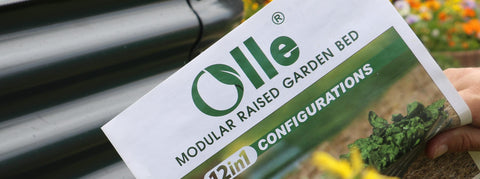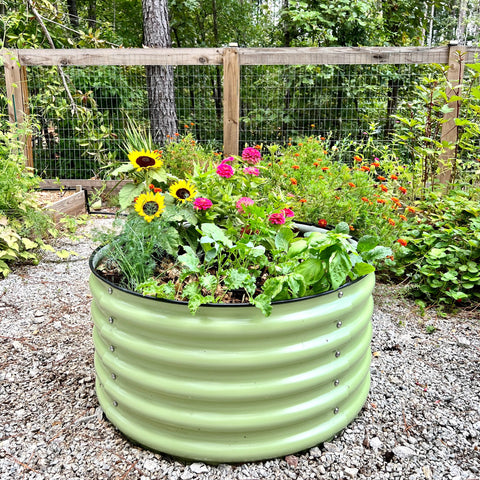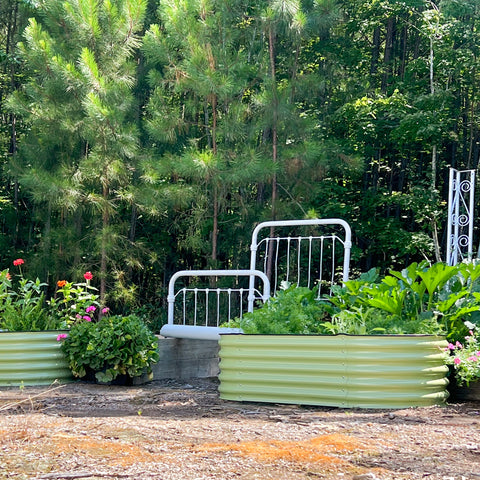Knowledge from Olle Garden Bed: The Use of Cow Dung in Gardening Q&A
Cow dung is an excellent all natural multipurpose fertilizer. This type of fertilizer is mild to seedlings because of its low nitrogen content, but it also has a very good balanced nutrient ratio. The following content also has some reference value for raised garden beds.
In addition, cow dung usually contains almost no weed seeds because it has passed through the cow's comprehensive four stomach digestive system.
Although you may worry about the unpleasant smell when using manure as fertilizer in your garden, you can usually prevent this problem by following the process of composting manure.
First, it dries before it is added to any compost heap, bin, or other system. In addition, the composting process can lead to high heat levels. For these reasons, the complete compost and bagged cow dung you may buy at the local horticultural center is almost odorless.

This article answers the 17 most common questions about the use of manure in gardens. Read on to learn more.
#1 – What is the difference between cow dung and cow dung?
Both kinds of dung are organic materials, but the salinity level is the main difference between turned dung and cow dung. Diversion dung usually contains more salt than cow dung, so it may have a negative impact on your plants.
Another difference between cow dung and cow dung is weed seed content. The diverter dung usually contains more weed seeds.
#2 – What's the use of cow dung?
Cow dung is an excellent supplement to any composting project. You can use it as fertilizer to provide nutrition for any garden plant. You can also use it as a soil conditioner to improve soil conditions.
Note: When planting root crops, add feces 4 months before planting to help reduce any potential bacterial contamination.
#3 – Is cow dung safe?
Cattle dung is pH balanced, so it is safe for most plants. In terms of pathogens, when used after composting, you can determine that the heat involved in the composting process has killed diseases, pathogenic microorganisms and weed seeds.
#4 – How much cow dung should I add to my garden?
Less than a pound of cow dung is used per square foot of treated area. Apply the modifier to the soil surface, and then plough it to a depth of about 9 inches. [Source]
#5 – Can you put too much cow dung in the garden?
If you add more feces to the garden than the recommended amount, you may encounter overgrowth of vegetation in and around the garden. In addition, if you use stool, if you overuse it, you are more likely to suffer salt damage.
In addition, adding too much manure to the garden can cause environmental problems, such as nutrient runoff and nitrate leaching
#6 – Which vegetables do not like cow dung?
Cow dung is good for all vegetables, but some heavy feeders (such as tomatoes) require additional application throughout the growing season. Root vegetables (such as potatoes and carrots) are not.
Too much dung will provide them with needlessly high nitrogen levels. Instead, you should provide your rhizome vegetables with additional leaf compost, wood ash, green sand or crushed granite to provide more potassium and phosphorus.

#7 – How do I prepare cow dung for my garden?
You can use fresh cow dung at the end of the growing season (after harvest) and let it compost on site throughout winter and spring. To do this, you should mix it with lighter materials, such as straw or leaves, and use it as mulch for farming when spring comes.
You can also completely solidify cow dung by composting it in a compost bin or compost. Cow dung is considered as the green component of compost, so please be sure to balance it with the brown component as described in our article. [Link]
#8 – Can I use compost instead of cow dung?
Fresh cow dung and solidified compost are not interchangeable. You can use a small amount of fresh cow dung as an ingredient in an ornamental garden environment, because it will not touch the roots or stems of plants. In most cases, cow dung should be composted before being added to the garden.
#9 – Is chicken manure better than cow manure?
Chicken manure is very rich and hot. Do not apply it directly on the garden bed, as it is likely to burn the roots and stems when decomposing. Instead, add chicken manure as a green ingredient to your composting project.
Cow dung is not as hot as chicken dung, but be careful when using raw cow dung, as described in Questions 8 and 9.
#10 – What are the advantages and disadvantages of using cow dung as the sole fertilizer?
On the plus side, cow dung is very nutritious. It is all natural. This kind of organic matter can improve the soil quality, which is impossible for synthetic fertilizer.
Compared with synthetic fertilizer, another advantage of aged manure is that its nutrients are released naturally and slowly. Therefore, continuous use of cow dung to improve soil can provide stable nutrition for your plants.
The downside is that it takes some time to use cow dung. It should be composted first, which is a process of several months. This can cause you to feel impatient, especially when you compare it with chemical fertilizers, which often seem to produce results almost immediately.
You must realize that fertilizers tend to be like plant candy. It may bring them energy and promote their growth, but this will not last and will not help the health of plants. Natural fertilizers such as cow dung will help you grow naturally strong, healthy, pest resistant and disease resistant plants.

#11 – Is cow dung good for tomatoes?
Cow dung is very suitable for tomatoes, which are diazo feeders.
#12 – How long does cow dung take to compost?
For proper composting, your compost material should be heated to a temperature of 130 to 140 ° F. Under ideal conditions, this may occur within 24 hours. Once the pile has been thoroughly heated and cooled, you can turn it (or transfer it in the case of a trash can).
However, depending on weather conditions, it may take 2 to 6 months to complete the curing or decomposition process.
#13 – How do you put manure in the garden?
After correctly composting cow dung, take it to the garden one month before planting time. Spread it evenly on the soil surface at a rate of about 40 pounds of solidified manure per 100 feet of garden soil. Once the cow dung or compost is evenly distributed on the ground, it should reach a depth of about 9 inches.
#14 – Is cow dung safe for the garden?
It is safe for the vegetable garden to compost cow dung thoroughly and properly. Raw cow dung may not be. Direct application of fresh fertilizer to the garden bed less than 3 months before harvest may transfer E. coli (Escherichia coli) to the soil. This can contaminate vegetables dangerously.
#15 – Can you mix manure with potted soil?
You can enrich and expand the potting mix by combining it with thoroughly composted, screened cow dung. It can also be used as topdressing for potted plants and container plants.
#16 – Can you mix manure and compost?
You can add cow dung to the compost heap, whether fresh or dry. If you add fresh cow dung to the pile, you will want to cover it with brown material, such as straw, dry leaves or chopped newspapers, which will help reduce any odor problems.
When you introduce manure into the compost pile, it is best to leave it in a layer. Then, mix them as you turn the stack.
#17 – Can you quickly turn cow dung into vegetable food?
You can make cow dung tea, which can be poured directly on the soil or applied as a foliar spray. To make this mixture, fill a bucket or other container with fresh cow dung in about one-third of the space.
Then, fill the rest with fresh water. Allow the mixture to stand and settle for about 24 hours, then pour into the filter to remove most of the solids.
